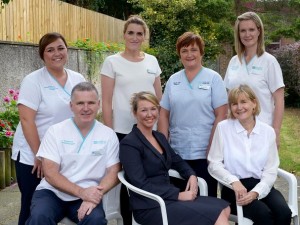http://newrytimes.com/2014/10/27/improved-care-for-stroke-patients-at-home/
To achieve the best possible outcomes for stroke patients, the Southern Trust aims to provide shorter intensive care in hospital followed by tailored support at home, says Angela McVeigh, Director of Older People and Primary Care Services at the Southern Health and Social Care Trust.

Angela
McVeigh (seated, right), Director of Older People and Primary Care
Services at the Southern Trust, with Newry and Mourne Community Stroke
Team staff
“Research shows that more than 75 per cent of strokes occur in people over 65 years of age and it can have a devastating impact on people’s lives affecting their ability to move, eat, speak or carry out simple tasks.
“The Community Stroke Team in Newry and Mourne works with patients and their carers on discharge from hospital and for up to a further 12 weeks in their own homes.
“The team works closely with medical and healthcare staff for the safe and appropriate discharge from hospital to ensure support networks are available in the home or alternative place of rehabilitation.”
Any patient referred to the team gets input from a range of professionals depending on their particular needs including a specialist stroke nurse, speech and language therapist, occupational therapist, physiotherapist, rehabilitation worker and social worker.
“The team provides assessment, information, advice and support to stroke patients and their families,” adds Mrs McVeigh. “Carers are vital in assisting the person with a stroke to come to terms with their illness and in making lifestyle changes.
“The carer is often involved in sessions to practice specific treatment, handling techniques and the use of equipment. To build strength and increase independence, some patients will have a home treatment programme developed with the therapist which they undertake every day with the support of a family member or carer.”
No comments:
Post a Comment